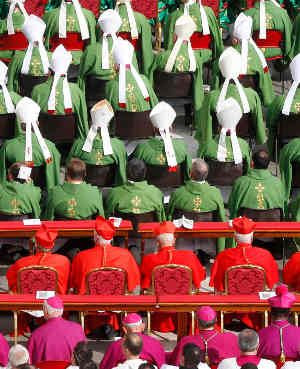 A few years ago NBC hit the jackpot with the show Heros. Probably you remember it, there’s
a man who can fly without wings, a man who walks through walls, another one
stops time and travels in time, etc. NBC built on people’s fascination with the
ability to do that beyond the physically possible. The Fantastic Four movies,
Spider man, Superman, and many television shows also build on this fascination.
A few years ago NBC hit the jackpot with the show Heros. Probably you remember it, there’s
a man who can fly without wings, a man who walks through walls, another one
stops time and travels in time, etc. NBC built on people’s fascination with the
ability to do that beyond the physically possible. The Fantastic Four movies,
Spider man, Superman, and many television shows also build on this fascination.
The biographers of saints of the past centuries also built
on this fascination. Many times saints were presented as having all sorts of
preternatural powers. For example, St. John Bosco was a deeply spiritual and
dedicated priest of the 19th century. Sadly, the Salesian baiographers
emphasized stories that Don Bosco had super human powers and did not give the
proper attention they should have given to his spirituality. St. Francis of
Assisi was a preacher with his eyes set on the journey to Christ. He was
determined to fight against the materialism that was taking hold of the people
of his time. He demanded that they return to the spirituality that was the
strength of the Church. But St. Francis is often portrayed as having powers like
having conversations with animals. Maybe he did, and maybe he didn’t. The point
is that we often stop at the fantastic details and we lose the essence of
things.
Giving all sorts of strange powers to the saints actually
diminishes their message. Instead of seeing them as people like us whose heroic
lives we can follow, we turn them into preternatural creatures with powers
beyond our capability. We should not dismiss the saints so easily by turning
them into plastic, fantasy figurines, whose lives are nice stories but
impossible for us to follow. No! the saints were and are real people who had to
fight the same battles we all fight to serve the Lord. Some of them had terrible tempers, like
St. Jerome and St. Paul. Some of them had to recover their spiritual lives
after giving in to sin, like St. Ignatius Loyola, St. Francis of Assisi, and,
of course, St. Augustine. Some had
to be courageous and stand for the faith when every fiber of their body was
terrified at what would happen to them, like St. Thomas More, St. Agnes, and
St. Vincent de Paul.
The saints were normal human beings like you and me, they
were fully human. To be fully
human is to allow the best of our humanity to dominate our lives. As human beings we are both physical
and spiritual. The saints allow the spiritual aspect of their lives to be
integrated into the physical. They were and are the best of us. But they are
not plastic. They are real.
So, what are we doing this morning [evening] well, we are
honoring the saints. We recognize that they are with God and we call upon their
intercession. What do we mean by that? Well, we ask the saints to pray to the Lord for us, to help us in
the struggles of our lives. We ask the saints to help us also embrace our
baptism in such a way that we also will be clothed in the Blood of the Lamb.
The saints are our heroes. But they are neither the
Fantastic Four nor Captain America or Spiderman, the saints are real people
whose heroic lives give us the example of what it is to be fully human; the
saints are our intercesors whose prayers give us the grace to be men and women
who are in the midst of the world, but with the focus on God and the things of
heaven, the things that will shine for eternity ■





































